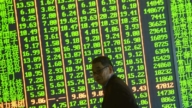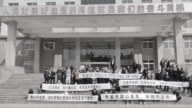【新唐人2013年09月11日訊】根據美國《華爾街日報》報導,中國信貸擴張速度已超過2008年美國金融危機前的水準,曾在金融危機作空大撈一筆的投資人開始將空頭目標鎖定中國,押注美式金融危機可能在中國重現。而全球最大空頭基金公司尼克斯聯合基金總裁吉姆•查諾斯日前也大膽的作出預言。他說,「中國金融危機勢必發生,只是或早或晚的區別。」一些經濟學家們則表示,中國債務的快速上升是導致未來危機的決定性因素。
根據國際清算銀行(BIS)數據,中國企業與家庭信貸快速攀升,從2008年佔國內生產總值(GDP)120%左右,到目前超過170%,這些資料還不包括金融企業債務在內。
相較於美國金融危機前信貸激增期間,該比率從2001年的143%,升高至2008年的177%,日本則是在1989年之前10年曆經類似信貸擴張。
瑞士銀行(UBS)資深經濟顧問馬格諾斯(George Magnus)表示,類似美國房市泡沫化過程,中國透過無節制的信用擴張來刺激經濟,而非尋求更好的經濟成長動力,導致收入差距擴大,這些都是一國處於金融動盪相對嚴重階段的預警跡象。
北京天則經濟研究所副所長馮興元:「美國的聯邦制的特點就是,任何一個職位,任何一個機構它沒有絕對的權力,中國的話,基本上是行政部門他想做甚麼,我們的人大基本上是確認或者事後確認或者是根本也不需要確認的這樣一種關係。」
中共總理李克強9號在英國《金融時報》發表文章,他強調中國已經不可能沿襲高消耗、高投入的老舊模式,而是必須統籌「穩增長、調結構、促改革」。
馮興元:「中國要解決問題,沒有別的出路,只有民營化一條路,但是他們的國企的改革,國有銀行的改革會有很大的阻力。」
瑞士銀行資深獨立經濟顧問馬格諾斯(George Magnus)表示,中國經濟當前狀況與美國當年的相同之處在於,都是通過(巨額信貸投放的方式來刺激經濟,而不是去尋求更好的經濟增長動力,並且收入差距日益擴大。馬格諾斯還表示,在中國,由於政府控制經濟,且中國決策者們已經目睹了美國經濟泡沫的破滅,中共當局將能夠以西方國家無法動用的辦法來應對,但這並不意味著不會造成任何負面衝擊。
《新唐人》特約經濟評論專家傑森:「中國的經濟它不是一個正常的GDP,它不是有自身的一個運作機制的生命體,它本身實際上是中國(共)政府嚴格控制的一個政治衍生物。」
有網友說,數據修飾、印鈔機、專政,造就中國不會出現發達資本國家金融危機,如果出現危機必將是由於在調控過程中政府有意為之或力不從心!
根據中共央行網站公布的資料顯示,近10年來中國貨幣供應量不斷增加。從1999年人民幣廣義貨幣供應量的11.76萬億,到2012年10月底的93.64萬億元。外界認為,貨幣就像水一樣流出來,必然帶來災難。
傑森:「它(中共)知道這個泡沫,知道這個定時炸彈,但是它希望用拖延時間的辦法,想要找一個要嘛叫軟著陸,要嘛叫做緩和的方法,讓它可控的爆破,可控的崩塌,這是它們的想法,但是能不能做到?這點就是一個巨大的問號。」
全球最大空頭基金公司尼克斯聯合基金總裁吉姆•查諾斯,今年七月接受CNBC採訪時表示,中國的信貸泡沫是世界層面的,而且將變得越發糟糕。
採訪/陳漢 編輯/黃億美 後製/郭敬
China Credit Levels Overtakes USA
The Wall Street Journal (WSJ) reported
that China’s credit has risen quickly.
It has exceeded US credit levels before its crisis in 2008.
Currently, investors, who have made a fortune during
the crisis, are now moving their target to China.
Investors have made billions betting against US
economies and are likely do the same on China.
James Chanos, an US hedge fund manager
and founder of Kynikos Associations recently
explained that China’s financial crisis seems
to have started sooner rather than later.
Some economists said that China’s rapid rising
debt is a decisive factor leading to future crises.
WSJ reported on data from the Bank
for International Settlements data.
China’s corporate and household credit has risen
quickly, from around 120% of gross domestic
product in 2008, to more than 170% today.
This does not include debts owed by financial companies.
In it’s credit boom, the US rose from
143% in 2001, to 177% in 2008.
Japan had a similar run in the decade before 1989.
George Magnus, a senior independent economic
adviser to Swiss Bank UBS, commented.
The similarities to the U.S. are a wanton use of the credit
system to substitute for better sources of economic growth.
This is with a background of rising income inequality.
These are all telltale signs of a country at a
relatively advanced stage of financial instability.
Feng Xingyuan, deputy director at
Unirule Institute of Economics, Beijing:
“In the US, there is no absolute
power for any position or any agent.
In China, basically, the administration does what they like.
The People’s Congress’s duty is only to confirm,
subsequently confirming or not confirming."
On September 9, Premier Li Keqiang
published an article in the UK’s Financial Times.
Li stressed that China can no longer afford to continue
with an old model of high consumption and high investment.
Instead, China must take a holistic approach in pursuing
steady growth, structural readjustment and further reforms.
Feng Xingyuan: “There is no other
way for China to solve the problem.
Privatization is the only way.
However, the implementation of reform on state-owned
businesses and banks can encounter large obstacles."
WSJ cited George Magnus.
In China, the central regime controls the economy
and policy makers witnessed the US go bust.
Beijing will be able to respond in ways
that the West weren’t capable of doing.
But it doesn’t mean it won’t be painless.
Jie Sen, NTD special economic commentator:
“Chinas GDP is abnormal. It is not
calculated from a natural operation system.
It actually was a political derivative, and
strictly manipulated by the Chinese regime."
Netizens said that data modification, bank note
printing machines, and dictatorship will mean
that China won’t appear to face similar financial
crises, as happened in advanced countries.
If there is a crisis, it will be the government’s intention,
during the process of adjustment or due to lack of power.
China’s Central Bank data shows that over the past
10 years, China’s expanding money supply increased
from 11.7 trillion Yuan in 1999, to 93.64 in October 2012.
Outsiders believe that if money runs like
water, it will inevitably bring disasters.
Jie Sen: “The CCP knows about bubble
issues and knows it will burst in any minute.
However, the CCP hopes to use the way of
delaying time, so as to find a soft landing.
Or it will try to use a gentle way, and
let the bubbles burst within its control.
This is likely their idea.
Can they find the way?
This is a big question."
James Chanos was interviewed in July by CNBC.
He said that the credit bubble in China is “world-class"
and is getting “worse and worse and worse."

























